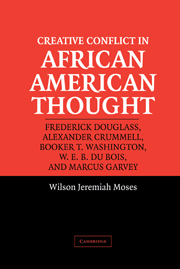Book contents
- Frontmatter
- Contents
- Acknowledgments
- Preface: Struggle, Challenge, and History
- 1 Introduction: Reality and Contradiction
- FREDERICK DOUGLASS: THE INDIVIDUALIST AS RACE MAN
- ALEXANDER CRUMMELL: THE ANGLOPHILE AS AFROCENTRIST
- 5 Alexander Crummell and Stoic African Elitism
- 6 Alexander Crummell and Southern Reconstruction
- 7 Crummell, Hero Worship, Du Bois, and Presentism
- BOOKER TALIAFERO WASHINGTON: THE IDEALIST AS MATERIALIST
- W. E. B. DU BOIS: THE DEMOCRAT AS AUTHORITARIAN
- MARCUS MOZIAH GARVEY: THE REALIST AS ROMANTIC
- CONCLUSION: RESCUING HEROES FROM THEIR ADMIRERS
- Index
6 - Alexander Crummell and Southern Reconstruction
Published online by Cambridge University Press: 07 November 2009
- Frontmatter
- Contents
- Acknowledgments
- Preface: Struggle, Challenge, and History
- 1 Introduction: Reality and Contradiction
- FREDERICK DOUGLASS: THE INDIVIDUALIST AS RACE MAN
- ALEXANDER CRUMMELL: THE ANGLOPHILE AS AFROCENTRIST
- 5 Alexander Crummell and Stoic African Elitism
- 6 Alexander Crummell and Southern Reconstruction
- 7 Crummell, Hero Worship, Du Bois, and Presentism
- BOOKER TALIAFERO WASHINGTON: THE IDEALIST AS MATERIALIST
- W. E. B. DU BOIS: THE DEMOCRAT AS AUTHORITARIAN
- MARCUS MOZIAH GARVEY: THE REALIST AS ROMANTIC
- CONCLUSION: RESCUING HEROES FROM THEIR ADMIRERS
- Index
Summary
On May 30, 1885, Alexander Crummell addressed the graduating class of Storer College at Harper's Ferry, West Virginia. Alexander Crummell – tall, black, regal, erudite, dramatic, but overshadowed by Frederick Douglass on this as on other occasions – so handsome, so romantic, so glamorous and eloquent was Douglass! The conflict between them – always respectful, but never to be denied – was one of images and personalities, as well as ideologies. On that occasion, as usual, Crummell voiced his perpetual suspicions regarding mass democracy, although, ironically, he had always worked more intimately with the grassroots than Douglass had done or cared to do. Although born free and provided a classical education by long-suffering and devoted parents, Crummell had devoted his youthful energies to poor, unlettered black congregations in several American cities and in African frontier settlements, although in his later years he worked, very testily and with much turmoil, among Washington's “aristocrats of color.”
Douglass was born a slave and had an instinctive “feel” for folklore and folkways that many anthropologists never master, but – although putatively a man of the people – he had moved beyond all that. He became a “public intellectual.” He had a comfortable house in Anacostia. His best friends, and most faithful admirers, were middle-class white women. He had recently married one of them and was about to embark on a honeymoon in Europe. Douglass made it clear that he had no taste for toiling among the masses.
- Type
- Chapter
- Information
- Creative Conflict in African American Thought , pp. 103 - 120Publisher: Cambridge University PressPrint publication year: 2004



